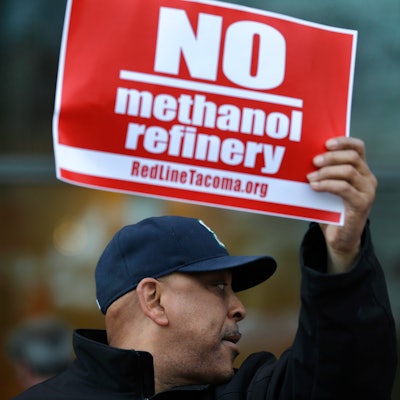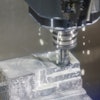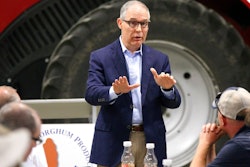
(AP) — The Pacific Northwest could become a major hub for methanol production if three proposed refineries are built along the Columbia River and Puget Sound.
A China-backed consortium, Northwest Innovation Works, has proposed two plants in Washington and a third in Oregon to convert natural gas to methanol, which would be shipped to China to make plastics and other consumer goods. But those plans are running into opposition.
On Friday, the company temporarily put its project in Tacoma on hold, saying it has been "surprised by the tone and substance of vocal opposition." Washington Governor Jay Inslee has embraced the projects as a boost to the state's clean energy future. He has said the investments — about $7 billion for the three plants — would be one of the largest foreign investments in the U.S. by a Chinese company.
Supporters say the projects would create hundreds of jobs and infuse billions to the region. Opponents are concerned about environmental and health impacts.
More than 1,000 people attended a hearing this month on the Tacoma project, which would produce 20,000 metric tons a day and dwarf other methanol plants planned or being built in the U.S. A citizens group is sponsoring an initiative to require voter approval for water permits exceeding one million gallons a day. The city of Federal Way passed a resolution opposing the project.
"We're talking about building enormous petrochemical refineries on the shorelines of our most important water bodies. That's dangerous," said Eric de Place, policy director for Sightline Institute, a progressive think tank.
Company president Murray Godley said in a statement that the project "provides an exciting opportunity for Washington and Oregon to become world leaders in addressing climate change through innovation by producing methanol and the products we use every day in more environmentally responsible way." But he said the company would take the next few months to engage the Tacoma community in more dialogue
Methanol, a wood alcohol, is used to make olefins, a component in everyday products such as eyeglasses, insulin pumps and fleece jackets, said Mandy Putney, a company spokeswoman. Most methanol in China is produced using coal, but the Northwest plants would use natural gas, which is cleaner, she said.
As prices have dropped, natural gas has attracted industrial consumers who use methanol as a feedstock, said Katie Teller, an economist with the U.S. Energy Information Administration. Several methanol plants have been proposed recently, a few have come on line and more are expected in the next few years, she said.
In the Northwest, the largest of three refineries will be built on the site of a former aluminum smelter in Tacoma. Other plants are proposed for Kalama in southwest Washington, and at Port Westward in Oregon, about 30 miles north of Portland.
The Kalama project is the furthest along in its environmental review. A draft is expected next month, and construction could begin by early 2017. Inslee said last month there are questions about water, pollution and other issues. There are also upsides, including that the plant would use natural gas rather than coal, Inslee said.
"I do think there's a legitimate interest in Washington to look at technologies that can give us products that we use here in a way that reduces pollution," Inslee said.
Doug Mackey, 51, a Tacoma native, opposes the project for a number of reasons, including the amount of water and electricity that will be consumed. Many residents remember the Asarco copper smelter plant, which resulted in arsenic, lead and other contamination, he said.
"It's an aching feeling of no, no, not again," he said.





















